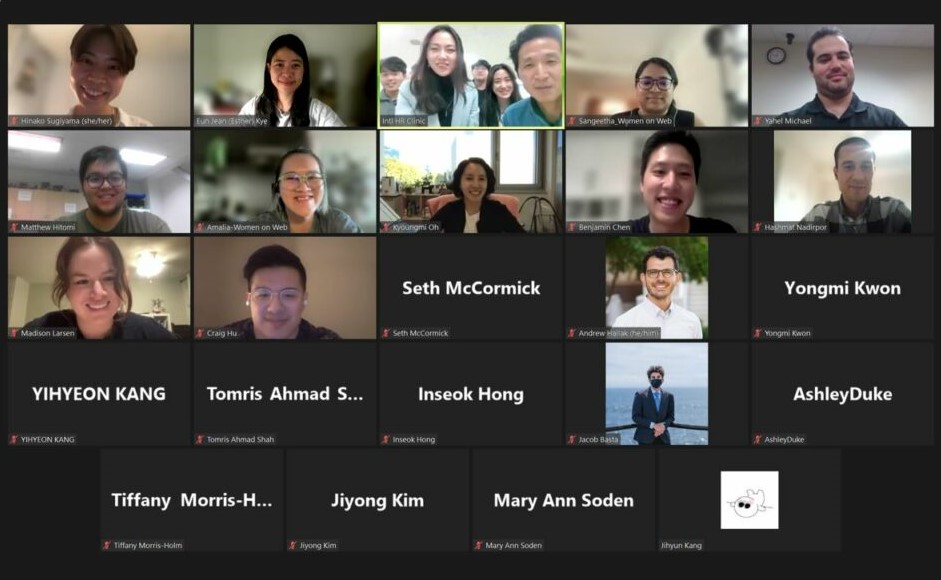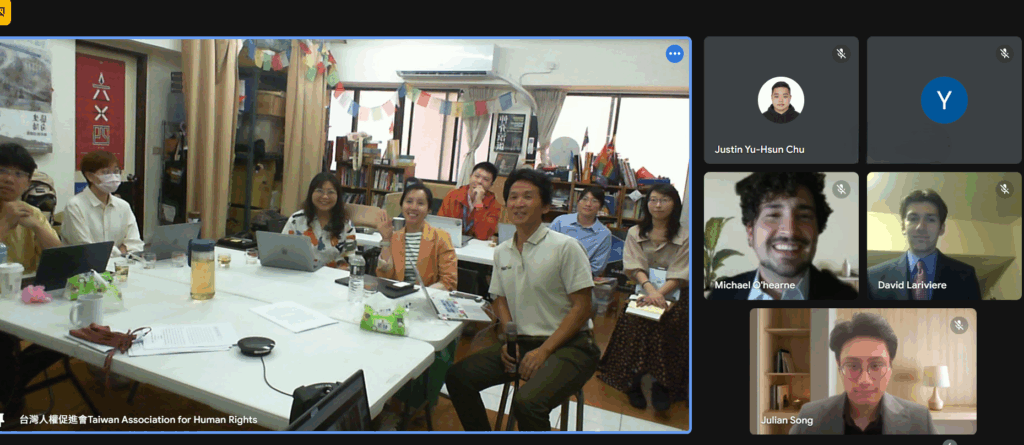
On 9 November 2023, the Korea University Law School’s International Human Rights Clinic (hereafter “the Human Rights Clinic”) made a presentation focusing on the necessity and possibility of appeals and constitutional complaints, while the UC Irvine Law School’s International Justice Clinic supported this effort by releasing an amicus brief.
The main points are as follows:
The Human Rights Clinic briefed on the reasons for appealing the loss and filing a constitutional complaint. They argued that the procedural flaws in the administrative actions by the Korea Communications Standards Commission (hereafter “KCSC”), the lack of a legitimate basis for these actions, and the subsequent abuse of KCSC’s authority justified an appeal. According to Articles 21 and 22 of the Administrative Procedures Act, parties must be notified and a hearing must be held when an administrative action imposes duties or restricts rights. The first trial ruled that Women on Web was not a “party” to these notifications, but since the lawsuit aimed at canceling the administrative actions, the right to be notified and have a hearing was inseparable from Women on Web’s rights. Therefore, Women on Web should be recognized as a “party” to the notifications and hearings. Nevertheless, Women on Web was not notified in advance, automatically denying them the right to post-remedy procedures. The first trial justified the omission of the hearing by stating that the site closure would be delayed by 10 days if a hearing were held, but this justification was insufficient. Women on Web provided medication certified as safe by the WHO under expert consultation. Fundamentally, the urgency of the situation was not sufficient to justify such a swift action by the Korean government, given that the distribution of the medication had not been approved domestically.
Additionally, the basis for KCSC’s administrative action to shut down Women on Web’s site was insufficient. Providing information about abortion medication cannot be considered a crime. Even if the Pharmaceutical Affairs Act prohibits the distribution of drugs, Women on Web only requested donations without mandating monetary compensation for the medication from users. Providing information about abortion and medication verified for safety by the WHO is essential and unavoidable for women in Korea, where abortion rights are still denied. Therefore, KCSC’s administrative action lacked sufficient basis as it denied this imminent risk. Lastly, the Human Rights Clinic argued that this administrative action constituted an abuse of power. KCSC did not only block information on the distribution of abortion medication but completely blocked access to the website. Blocking the entire site infringes on freedom of expression and should only be allowed in exceptional cases, and even then, the principle of proportionality must be observed to minimize infringement. However, KCSC did not adhere to this constitutional requirement, thus abusing its authority.
As grounds for the constitutional complaint, the Human Rights Clinic argued that Article 21(4) of the Act on the Establishment and Operation of the Korea Communications Standards Commission, which stipulates the “review and correction of information necessary to promote sound communication ethics as prescribed by Presidential Decree among information open to the public via telecommunications,” and the operation of the KCSC itself violated the principles of clarity, reservation of law, prohibition of comprehensive delegation, and proportionality, making it unconstitutional. The concept of “promoting sound communication ethics” in Article 21(4) is too vague, potentially leading individuals to self-censor their expression, thereby violating the principle of clarity. The principle of reservation of law is also violated, as there is a significant difference between deleting certain information from a website and blocking access to the entire site. Therefore, the legislature must establish concrete and clear guidelines for the review and correction system and delegate this authority through a Presidential Decree. However, Article 21(4) of the Act simply states that it is the KCSC’s duty and does not delegate this authority through a Presidential Decree, leaving room for arbitrary judgment by the administrative body. Thus, the KCSC’s administrative action in this case violated the principle of reservation of law. These two principles lead to the prohibition of comprehensive delegation. When the legislature delegates legislative authority to an administrative body through a Presidential Decree, it must first clearly define the scope of the delegation by law and ensure predictability. Furthermore, when the executive restricts basic rights, the requirements for specificity and predictability of the delegation become stricter. However, the vague concept of “sound communication ethics” does not meet these requirements, thus violating the prohibition of comprehensive delegation. The principle of proportionality means that restrictions on basic rights and legitimate interests through regulation and prohibition must be balanced according to the legality of the purpose, appropriateness of the means, minimization of harm, and balance of legal interests. Considering this, the system where an administrative body determines the illegality and harmfulness of online information itself can be seen as excessive regulation. Even if only a small portion of the content needs regulation, there is a possibility that the administrative body may regulate the entire expression, with the abstract value of sound communication ethics potentially overriding freedom of expression.
The UC Irvine Law School International Justice Clinic (hereafter “the Justice Clinic”), under the direction of former UN Special Rapporteur David Kaye, drafted and shared an amicus brief for the Women on Web case. The Justice Clinic pointed out that KCSC’s blocking of Women on Web’s website does not comply with international human rights law. The Justice Clinic criticized that although South Korea became a signatory to the ICCPR on April 10, 1990, KCSC’s site blocking violates Article 19(2) of the ICCPR, which guarantees the freedom to seek, receive, and impart information and ideas of all kinds. The Justice Clinic urged the South Korean government to seize the opportunity to reaffirm its commitment to international human rights law by having the court invalidate KCSC’s administrative actions.


0 Comments